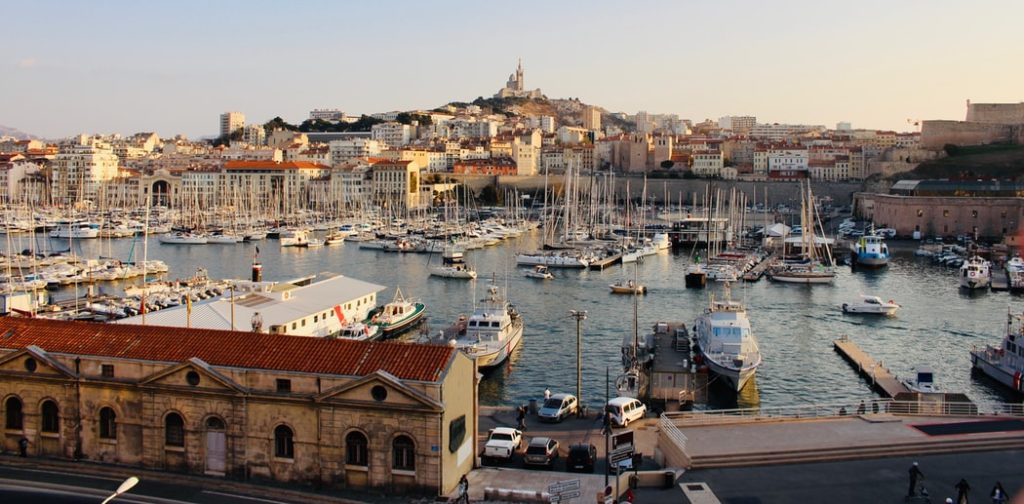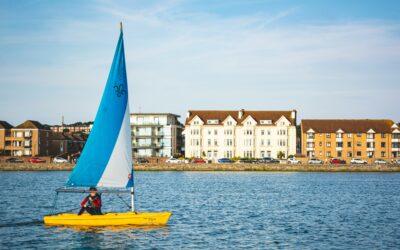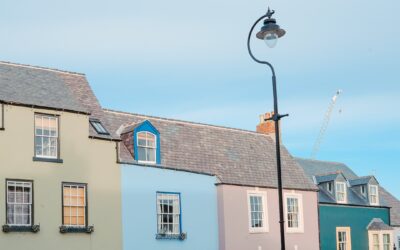On 1 June, SHC by Sweden in collaboration with the French national federation FNCCR organized a digital conference on the topic of sustainable heating and cooling, summarized below • A commercial building complex, located at the Harbor of Marseille, has been connected to the Thassalia marine geothermal network and will be heated and cooled with the help of seawater • The 6 km long district heating network in La Bourboule is nearing completion after almost 2 years of construction • Read below about sustainable heating and cooling developments in France in the May news update

The building complex, located at the Harbor of Marseille, will now be supplied with hot and chilled water from the Thassalia geothermal power plant to provide both heating and cooling. The installation exploits heat energy from the Mediterranean Sea, which allows the heating and air conditioning to be supplied by 70% renewable energy. End subscribers will, therefore, benefit from the reduced VAT at 5.5% that applies to urban networks that supply heat with more than 50% of renewable energies. The project will equally reduce the buildings’ greenhouse gas emissions by 70%.
Engie Solutions is the responsible provider and has contracted to supply the center for a period of 10 years. The project received 3.3 million EUR in aid from the ADEME Heat Fund. The European Regional Development Fund (ERDF) is also supporting the project.
Read more in article by Engie here
Read more in article by DHC News here
Read more in article by POSITIVR here
The network fueled by a biomass burner will soon be supplying heat to 90 buildings. 70 are already operating, including schools, churches, communal spaces and hotels amongst others. The operation involves two wood boilers, which will run together in the winter. The largest one will run during the shoulder seasons, which the smaller one will produce DHW and be used for swimming pools. 95% of the of the energy production will be generated by the wood boilers, while 2 gas boilers are installed as backup and occasional reinforcements. The water is heated to nearly 100 degrees and distributed at 90 degrees throughout the city. The network is predicted to generate “substantial savings” and will avoid the consumption of alternative fossil fuels.
The project is carried out by LE Energie and the ash from the burnt wood will be used by local farmers for land application. Smoke will be channeled into bag filters to avoid the emission of fine particles.
Read more in article by La Montagne here
Read more in article by DHC News here
The Saint-Vincent-de-Paul operation (Paris, 14th arrondissement), will use a water loop that exploits non-potable water taken from the Seine or Canal de l’Ourcq to heat 59,000 m² of new or rehabilitated buildings on the site of the old hospital. The loop will channel water in a network separate from drinking water, which normally is used for cleaning streets, sewers and to water green spaces. Thanks to this new project, it will also be used as a heat transfer fluid that will fuel the hot water loop by means of a 280 kW heat pump before it is returned to the network. The recovered heat produced will cover 60% of the district’s heating needs.
CPCU, the Parisian urban heating company, a subsidiary of the City of Paris and ENGIE, will carry out the heat supply construction involving a 450 meter long low-temperature loop at 65 degrees. The hot water loop will also be connected to the main CPCU network where a heat exchange station will mobilize the Parisian steam network as a backup. The project demonstrates the transformation of heating networks with low temperatures that facilitates the integration of local renewable- or recovered energies.
Read more in article by Enerzine here
Read more in article by Construction Cayola here
On 1 June, SHC by Sweden in collaboration with the French national federation FNCCR organized a digital conference on the topic of sustainable heating and cooling.
The conference brought together FNCCR’s members, mainly public and private energy operators in France, to learn from Swedish experiences in district heating and cooling systems. The Swedish speakers that presented were Business Sweden, the Swedish Energy Agency, Profu & Värmemarknad Sverige, Sweheat & Cooling, E.ON Ectogrid, SVEBIO and the Celsius Initiative.
More than 60 people participated in the two-hour conference, which highlighted:
The Q&A sessions briefly touched base on developmental policy incentives, DH regulatory frameworks for energy and storage, and challenges related to public communication. The conference ended on the topic of community collaboration, where Celsius Initiative presented their collaboration hub that promotes energy transition in cities through innovation, networking and knowledge transfer.
The conference aimed to promote the collaboration with FNCCRs members and SHC by Sweden look forward to future dialogues with stakeholders in France.
To stay updated on news for sustainable heating and cooling, follow us on Twitter and LinkedIn, and subscribe to our Newsletter.
Sweden is at the forefront of decentralised heat networks technology. Our aim for “Sustainable Heating & Cooling by Sweden” is to facilitate knowledge sharing between British, French and Swedish stakeholders and develop and encourage environmental and economic best practice.
To find out how we can help you and your organisation, please contact our London or Paris-based “SHC” teams. We can introduce you to leading consultants, suppliers of technology and services who will be pleased to share know-how of the development of sustainable heating & cooling solutions.


